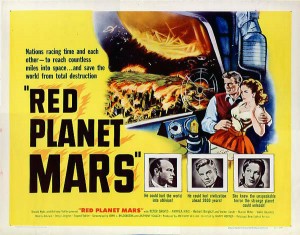 Sorry for being a little late with my Sunday Night Movie Feature, but I didn’t finish my Sunday Night movie until tonight, Tuesday night.
Sorry for being a little late with my Sunday Night Movie Feature, but I didn’t finish my Sunday Night movie until tonight, Tuesday night.
Exhaustion on Sunday prevented me from watching the film in a single seating as I prefer to do, and a migraine on Monday prevented me from doing anything at all except dragging myself through my day job.
So, onto the review and comments.
This week’s movie, Red Planet Mars (1952) I found what cruising through the list at Netflix. I’m a big fan of Netflix and especially of the instant-view capability through my Xbox 360. I saw the description and thought that this might be a campy movie worth a spin.
The film stars Peter Graves as scientist Chris Cronyn. Chris along with his fellow scientist wife Linda (Andrea King) have built a transmitter using new technology — the hydrogen valve — and are now attempting to contact the advanced civilization they believe is on the planet Mars. The world is thrown into panic and chaos by the messages they receive.
The film starts off strong, keeping fairly close to the science and paying attention to details such as the speed-of-light lag between Earth and Mars. It deals lightly, but does not ignore, the issue of finding a common means of communication between two beings without a common language. The characters are presented with consequences of the results of their messages. As Mars tells of fantastic life-spans and limitless energy whole industries panic and threaten to topple the economy of the west. There is a parallel story line about a German scientist working on his own hydrogen valve transmitter who is intercepting the messages for his Soviet masters.
This film did not work for me, but in order for me to tell you why it didn’t work I will have to deal in spoilers. Even though the film is 57 years old I’m going to put the rest behind a break for anyone who wants to avoid those mentioned spoilers.
The Soviets are of course delighted at the chaos in the west and see their triumph arriving via these messages.
Then the message that changes everything arrives — the Martians start talking about God and the message of love. The Martians relate that mankind was given the truth seven hundred lifetimes ago — a Martian lifetime having been revealed as 300 years — so that’s about 2100 years. Very conveniently meshing with the life of Christ.
The world changes again. The Communists are overthrown by a wave of religious fervor that sweeps through the Iron Curtain and bring peace and love to the whole world.
More religious themed messages arrive and brotherly love appears to be ready to conquer all. A sudden avalanche destroys the German scientist’s transmitter and the Martians go silent.
The German scientist arrived at the home/lab of the Cronyn’s and reveals to them that he had sent the messages that they thought were from Mars. He seeks revenge on the West and on the Soviets for his mistreatment.
At this point I could have hung with the film, but it went a step further that I just couldn’t follow it through.
The German scientist never sent the religious messages, and while he holds the couple captive, his own transmitter destroyed, a new message starts to arrive.
Apparently God needs radio transmitters, just as in Star Trek V he needed a starship.
(I know in the version we all saw it turned out not to be God, but I’ve heard that the test audiences in Texas of all places saw the original cut where it WAS God at the center of the galaxy.)
I detest religion being presented as factually true in SF. I’m fine and happy and expect people to have religion. That what people do, but keep your gods out of it. Be they Christian, Native Gods, or any other. That’s for a different kind of story.
Shame it fell apart into a preachy God loves us all and we’ve just lost the faith message film in the end, ’cause up until then was it fairly entertaining.
